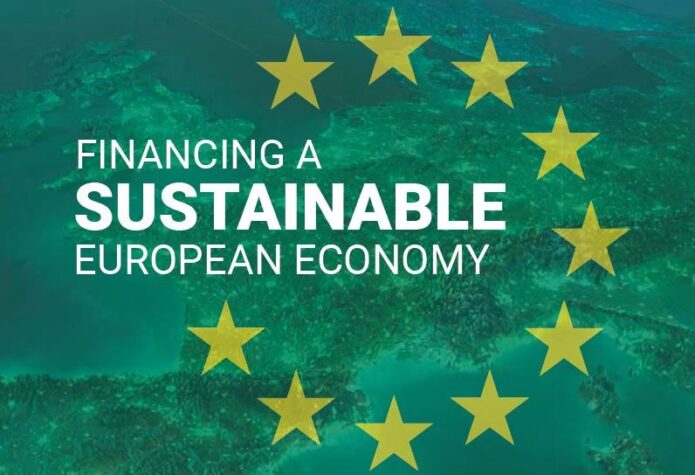Experts recommend EU develop world’s most sustainable financial system

The growing realisation that there are no alternatives to sustainable development has spurred the European Union to take leadership in the green transition towards a low-carbon economy. The European Commission’s High-Level Expert Group (HLEG) on Sustainable Financing provided its final recommendations for a comprehensive EU strategy on sustainable finance on 31 January 2018.
“It has been very encouraging for the HLEG to note the Commission’s high expectations. I am hopeful that our final report meets those expectations, and that it can serve as a basis for meaningful impact in supporting the development of a sustainable financial market within the EU”, says Magnus Billing, CEO of the Swedish pension fund Alecta and member of the HLEG.
The HLEG has consisted of 20 leaders from civil society, the finance sector and academia. They have been supported by nine observer institutions, of which NIB is one. The HLEG has had eight meetings since it first convened in January 2017.
“Making the world more sustainable requires lots of changes in the ‘real’ economy, but the financial system is ready to support these changes in a way that makes a difference”, says Esko Kivisaari, Deputy Managing Director of Finance Finland and also a member of the HLEG.
Reactions to some recommendations
As priority actions, the HLEG recommends establishing an EU sustainability taxonomy, starting with climate mitigation, in order to define areas where investments are needed the most. It also recommends developing official European sustainability standards for some financial assets, starting with green bonds.
Lars Eibeholm, Vice-President, Head of Treasury at NIB and observer to the HLEG, welcomes the two recommendations: “For NIB as an international financial institution with a specific mandate to enhance the environment, and as the biggest Nordic issuer of green bonds, this is a step in the right direction.”
“The recommendations bring clarity to the discussion of defining green and also raise the bar for issuing green bonds”, Mr Eibeholm says. “It is important to maintain the ‘greenness’ and to avoid ‘greenwashing’.”
Kivisaari says that the financial sector has come up with several initiatives for increasing sustainable financing, and that it is important that HLEG’s recommendations do not stop that.
“I believe that the HLEG report is important in stressing the need for definitions and taxonomies to help the financial sector and the ‘real’ economy work together”, Mr Kivisaari agrees.
Among others, the HLEG also recommends clarifying investor duties and to bring greater focus on environmental, social and governance factors into investment decisions.
Magnus Billing says the recommendation on investor duties has a significant importance.

“I firmly believe it will provide a strong impetus for the transition to a more long-term investment horizon by integrating social and governance factors into the different market actors’ investment processes.”
Magnus Billing
CEO of Alecta pension fund
Member of the European Commission’s High-Level Expert Group on Sustainable Financing
Positive initial EU signals
The HLEG gave its first initial recommendations back in July 2017, and there are signs that the European Commission and other EU institutions are acting swiftly on these recommendations.
In line with the HLEG’s early findings, Eurostat clarified in September 2017 the treatment of energy performance contracts in national accounts. The same month, the Commission proposed that the European supervisory authorities should promote sustainable finance as part of safeguarding financial stability.
In November, the Commission initiated a public consultation on investor duties, in line with the HLEGs early recommendation on fiduciary duties. During the One Planet Summit in Paris in December 2017, Valdis Dombrovskis, Vice-President for the Euro and Social Dialogue, and European Commissioner for Financial Stability, Financial Services and Capital Markets Union, took the political expectations to a higher level by signalling that the Commission is considering “green supporting factors”, which potentially could mean lowering capital charges for green investments. This has been fiercely discussed among the HLEG members and observers, but did not make it into the initial recommendations in July.
“The above demonstrates that the Commission has high expectations of the expert recommendations and is prepared to draw on them when it presents the EU strategy on sustainable finance”, says Mr Eibeholm.
The Commission is scheduled to organise a high-level conference to present the Commission Strategy and Action Plan on Sustainable Finance on 22 March.
Reality check and the way ahead
Asked how likely it is that the Commission will adapt some of the recommendations, Mr Kivisaari notes that the Commission has shown a lot of interest in what the HLEG does.
“I therefore assume they will put a few recommendations into practice”, he says.
“Already, setting up this expert group shows that the EU is serious about the issue. During the work of the HLEG, it has been good to see that all the members share the goal of making finance significantly more sustainable.”

We might have different ideas and opinions on how to get to that goal, but everybody is trying to do their best to get forward. The feeling is that the financial sector is ready to live up to the expectations it faces.
Esko Kivisaari
Deputy Managing Director of Finance Finland Member of the European Commission's High-Level Expert Group on Sustainable Financing
Read more:
Final Report 2018 by the High-Level Expert Group on Sustainable Finance